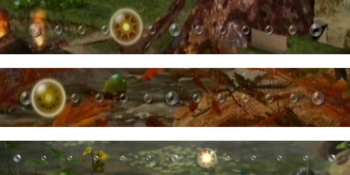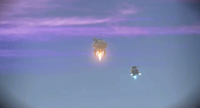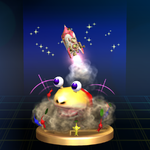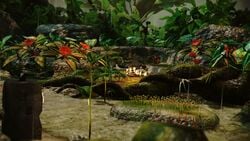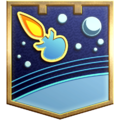Day: Difference between revisions
CortexCPU242 (talk | contribs) m (→Lift off: One link is enough for each.) Tag: Mobile edit |
Chazmatron (talk | contribs) m (→Sunset: updated image description) |
||
| (14 intermediate revisions by 10 users not shown) | |||
| Line 2: | Line 2: | ||
[[File:HUD Day counter P3.jpg|thumb|The day icon in {{p3}}.]] | [[File:HUD Day counter P3.jpg|thumb|The day icon in {{p3}}.]] | ||
The main [[Pikmin series|''Pikmin'' games]] take place over the course of several in-game '''days''' ({{j|日|Hi|Day}}). Dangerous creatures roam at nighttime, so exploration on [[PNF-404]] [[night expedition|generally]] only happens during the daytime. The number of days spent on the planet is also important in some games: in {{p1}}, [[Captain Olimar]] has 30 days before his life-support systems fail and he's stranded on the planet permanently, and in {{p3}} the number of days left is determined by how many bottles of [[fruit]] juice are left, for a maximum of 99 days. {{p2}} and {{p4}} have no day limit, and in {{npcp1}}, | The main [[Pikmin series|''Pikmin'' games]] take place over the course of several in-game '''days''' ({{j|日|Hi|Day}}). Dangerous creatures roam at nighttime, so exploration on [[PNF-404]] [[night expedition|generally]] only happens during the daytime. The number of days spent on the planet is also important in some games: in {{p1}}, [[Captain Olimar]] has 30 days before his life-support systems fail and he's stranded on the planet permanently, and in {{p3}} the number of days left is determined by how many bottles of [[fruit]] juice are left, for a maximum of 99 days. {{p2}} and {{p4}} have no day limit, and in {{npcp1}}, the [[Pikmin 1 (Nintendo Switch)|Nintendo Switch port of ''Pikmin'']], and ''Pikmin 3'', the player is given the ability to go back in time and retry from a certain day of their adventure through an option in the [[saved game selection menu]] in the case of ''New Play Control! Pikmin'' and Nintendo Switch port of ''Pikmin'', and a dedicated [[day selection menu]] in the case of ''Pikmin 3''. A common challenge run in the ''Pikmin'' games is to [[Challenge run#Low day|complete the game taking the least amount of days possible]]. | ||
The [[HUD#Sun Meter|Sun Meter]] at the top of the [[HUD]] indicates the amount of daylight left, so effectively, the time the player has left on the current day. A number on the top right corner indicates the current day. In the [[Story Mode]] of ''Pikmin'' games, a day lasts between 13 and 18 real-life minutes, depending on the game, version, and [[difficulty]] mode, as explained [[#Durations|here]]. Alternative game modes have days with varying lengths. As the day goes by, the lighting in the area changes much as it does on Earth, but enemy behavior and area layout remains constant throughout. | The [[HUD#Sun Meter|Sun Meter]] at the top of the [[HUD]] indicates the amount of daylight left, so effectively, the time the player has left on the current day. A number on the top right corner indicates the current day. In the [[Story Mode]] of ''Pikmin'' games, a day lasts between 13 and 18 real-life minutes, depending on the game, version, and [[difficulty]] mode, as explained [[#Durations|here]]. Alternative game modes have days with varying lengths. As the day goes by, the lighting in the area changes much as it does on Earth, but enemy behavior and area layout remains constant throughout. | ||
| Line 9: | Line 9: | ||
==Sunset== | ==Sunset== | ||
[[File:Clock.png|thumb|350px|The Sun Meter in | [[File:Clock.png|thumb|350px|The Sun Meter in the first 3 ''Pikmin'' games.]] | ||
When the sunset arrives, all leaders and Pikmin must stop what they are doing, retreat into the [[Onion]]s and ship, and spend the night in low orbit, due to the fact that many predators become active at night. Additionally, in {{p2}}, the [[Hocotate ship]] needs to be in low orbit to communicate with [[Hocotate]]. In {{p4}}, the Onion retreats to orbit, but the S.S. Beagle returns to the [[Rescue Command Post]]. | When the sunset arrives, all leaders and Pikmin must stop what they are doing, retreat into the [[Onion]]s and ship, and spend the night in low orbit, due to the fact that many predators become active at night. Additionally, in {{p2}}, the [[Hocotate ship]] needs to be in low orbit to communicate with [[Hocotate]]. In {{p4}}, the Onion retreats to orbit, but the S.S. Beagle returns to the [[Rescue Command Post]]. | ||
===Safe Pikmin=== | ===Safe Pikmin=== | ||
| Line 60: | Line 60: | ||
*[[Formidable Oak]]: Bulborb | *[[Formidable Oak]]: Bulborb | ||
;''Pikmin 4'': | ;''Pikmin 4'': | ||
*[[Sun-Speckled Terrace]]: | *[[Sun-Speckled Terrace]]: Bulborb and Dwarf Bulborb | ||
*[[Blossoming Arcadia]]: | *[[Blossoming Arcadia]]: [[Joustmite]] and [[Downy Snagret]] | ||
*[[Serene Shores]]: | *[[Serene Shores]]: [[Peckish Aristocrab]] and [[Aristocrab Offspring]] | ||
*[[Hero's Hideaway]]: | *[[Hero's Hideaway]]: [[Gildemandwee]] and [[Tusked Blowhog]] | ||
*[[Giant's Hearth]]: | *[[Giant's Hearth]]: Spotty Bulbear and Dwarf Bulbear | ||
*[[Primordial Thicket]]: | *[[Primordial Thicket]]: [[Moldy Slooch]] and [[Moldy Dwarf Bulborb]] | ||
The enemies in the sunset cutscene of ''Pikmin'' have unique "screaming" animations, and the Spotty Bulborbs and Shearwigs have unique eating animations. This phenomenon doesn't appear anywhere else in the main game. | The enemies in the sunset cutscene of ''Pikmin'' have unique "screaming" animations, and the Spotty Bulborbs and Shearwigs have unique eating animations. This phenomenon doesn't appear anywhere else in the main game. | ||
====Landing==== | |||
''Pikmin 4'' includes a fifth phase of the sunset, wherein the [[Pikmin 4 player character|player character]] and [[Oatchi]] return to the [[Rescue Command Post]] to spend the night there. The stats for the day are moved to this phase and are followed by some dialogue between major characters, typically [[Rescue Corps]] members and Olimar. The player character never partakes in this dialogue. | |||
{{clear}} | {{clear}} | ||
| Line 178: | Line 182: | ||
In ''Pikmin'', the shadows under [[Pikmin family|Pikmin]] and [[Olimar]] point in different directions as the day goes by. At the start of the day, they point to the southwest, at midday, to the south, and near the end, to the southeast. This is similar to sun-cast shadows on planet Earth, given that the sun rises on the east (and hence, the shadows are cast to the west), and sets on the west. In order to avoid rendering too many shadows at once and slowing the game down, Pikmin shadows are completely omitted if there are 51 or more Pikmin on the field. | In ''Pikmin'', the shadows under [[Pikmin family|Pikmin]] and [[Olimar]] point in different directions as the day goes by. At the start of the day, they point to the southwest, at midday, to the south, and near the end, to the southeast. This is similar to sun-cast shadows on planet Earth, given that the sun rises on the east (and hence, the shadows are cast to the west), and sets on the west. In order to avoid rendering too many shadows at once and slowing the game down, Pikmin shadows are completely omitted if there are 51 or more Pikmin on the field. | ||
In ''Pikmin 2'', the shadow limit does not exist, but shadows do not change direction as the day progresses and are cast directly under the leaders or Pikmin. In ''Pikmin 3'', all objects cast shadows, but | In ''Pikmin 2'', the shadow limit does not exist, but shadows do not change direction as the day progresses and are cast directly under the leaders or Pikmin. | ||
In ''Pikmin 3'', all objects cast shadows, and these shadows change direction throughout the day, but remain mostly directly below objects to allow depth to be judged more easily, only elongating very near the [[#Sunset|sunset]]. The direction of shadows corresponds with the location of the sun, which can be seen in the sky with the [[KopPad]] camera. The compass direction where the sun rises and sets varies between areas and segments. This is because different segments are rotated by varying amounts in the radar compared to their orientation within the area's model, which causes the direction of north to vary between segments. In segments where compass directions are not rotated relative to the area's model, the sun rises in the south, moves through the west of the sky, and sets in the north. Other segments have the sun rise and set in different directions based on their rotation. | |||
<gallery> | <gallery> | ||
Latest revision as of 13:16, November 26, 2024

The main Pikmin games take place over the course of several in-game days (日?, lit.: "Day"). Dangerous creatures roam at nighttime, so exploration on PNF-404 generally only happens during the daytime. The number of days spent on the planet is also important in some games: in Pikmin, Captain Olimar has 30 days before his life-support systems fail and he's stranded on the planet permanently, and in Pikmin 3 the number of days left is determined by how many bottles of fruit juice are left, for a maximum of 99 days. Pikmin 2 and Pikmin 4 have no day limit, and in New Play Control! Pikmin, the Nintendo Switch port of Pikmin, and Pikmin 3, the player is given the ability to go back in time and retry from a certain day of their adventure through an option in the saved game selection menu in the case of New Play Control! Pikmin and Nintendo Switch port of Pikmin, and a dedicated day selection menu in the case of Pikmin 3. A common challenge run in the Pikmin games is to complete the game taking the least amount of days possible.
The Sun Meter at the top of the HUD indicates the amount of daylight left, so effectively, the time the player has left on the current day. A number on the top right corner indicates the current day. In the Story Mode of Pikmin games, a day lasts between 13 and 18 real-life minutes, depending on the game, version, and difficulty mode, as explained here. Alternative game modes have days with varying lengths. As the day goes by, the lighting in the area changes much as it does on Earth, but enemy behavior and area layout remains constant throughout.
Any important objects that are moved from their original spot like a ship part, treasure (except in caves in Pikmin 2), and fruit will remain in the new spot on any following day. When an enemy is killed, it usually respawns in its original place after some number of days. Additionally, if an enemy's corpse is not brought back to an Onion before the end of the day, the corpse will disappear. Some enemies only appear on certain days. Some of the most notable enemies with this characteristic are the Smoky Progg, which disappears after day 15, the Ujadani, which only appear every 30 days, and the Goolix and Mamuta on The Impact Site, that appear on alternating days. For a list of all enemies that appear on exclusive days, please read the list of enemies in the corresponding area article.
Sunset[edit]
When the sunset arrives, all leaders and Pikmin must stop what they are doing, retreat into the Onions and ship, and spend the night in low orbit, due to the fact that many predators become active at night. Additionally, in Pikmin 2, the Hocotate ship needs to be in low orbit to communicate with Hocotate. In Pikmin 4, the Onion retreats to orbit, but the S.S. Beagle returns to the Rescue Command Post.
Safe Pikmin[edit]
When the sunset arrives, any Pikmin that are considered to be "safe" will be able to board their Onion, spend the night above the surface, and be ready to be picked up the following day. When the day ends, be it normally or from the pause menu, Pikmin will be considered safe if:
- They are in a leader's group.
- They are close to an activated Onion. (In Pikmin 3 and Pikmin 4, the safe zone's explicit limits are displayed when the sunset begins.)
- They are walking towards their Onion after being told to go inside, in Pikmin only.[1]
- They are close to an inactivated Onion, in Pikmin 2[2] and Pikmin 3 only.
- They are transitioning between sections of the area, in Pikmin 3.
It does not matter which Onion the Pikmin is close to, even if the Pikmin's type does not match the Onion's type.
In addition to these, any Pikmin that is buried will stay where they are buried, and will not be harmed over the night. Any other Pikmin that isn't safe or buried will be left behind on the surface and will be eaten by enemies during the night.
While it can be difficult to tell if a Pikmin is considered safe in the first 2 games, Pikmin 3 added some ways to know for sure. A large white circle appears around all activated Onions in the area, indicating that Pikmin within it will be safe. Although unactivated Onions do not show the circle, the safety radius still exists, and if a dormant Onion is activated after the sunset warning period begins, the circle will still not appear, but nearby Pikmin will still be counted as safe. This radius can also be seen on the radar. A small counter will appear on the top-right corner of the HUD to alert the player of how many Pikmin are in danger of being left behind. On the KopPad, what types of Pikmin that are idle are displayed near the top of the map, along with how many. Pikmin icons will also appear larger on the radar when the sunset is approaching, and the icons of those that are at risk of being left on the surface will also appear flashing on the radar. Finally, when the player attempts to finish the day from the pause menu, a warning will show up saying that Pikmin will be left behind, if there are indeed any Pikmin considered not safe when the player tried to end the day.
Phases[edit]
Warning[edit]
Some minutes before the sun is down, a message will appear on-screen warning the player that they need to gather their Pikmin. From here on, the music changes to a calmer remix. It is also at this point that the KopPad changes, and the Onions get their safety limits shown, in Pikmin 3. From Pikmin 2 onward, the normal area music fades out a couple of seconds before this phase begins.
Countdown[edit]
Sometime after the warning, a countdown from 10 takes place (9 in Pikmin 4). Each digit takes a few seconds to pass, as explained here, and is presented on-screen, slowly fading away to make way for the next one. 0 also appears, and the day doesn't end until after the 0 disappears completely. Interestingly, in Pikmin, after the counter reaches 4, the player is no longer able to interact with the S.S. Dolphin or open the radar.
Gathering[edit]
When the countdown finishes, or when the day is ended with the pause menu, two cinematic sequences take place. The first scene starts with all alive leaders and safe Pikmin following the leaders walking up to the landing site in a single group led by the leader who was selected when the day ended. The main leader then dismisses and orders every Pikmin to get on their Onions or ship. In Pikmin 3, if the player does not have any Pikmin in their group, the active leader will not do the dismiss animation and sound. Any Pikmin that is near an Onion, but away from the landing site will still climb to their Onion, despite not being shown. Any Pikmin that is buried will remain buried in the same spot and can be plucked on another day. After all the Pikmin have entered their Onion, the leader(s) are beamed into the ship.
A song plays during this cinematic, and while it is similar in each game, there is some variation. In Pikmin, the song is slower, and repeats a section twice, lengthening the cutscene when compared to the later games. In Pikmin 2, there are 4 songs that can play during this cinematic:
- If the player obtained no treasure, even if they gathered Pokos from enemies, a simple and quiet remix of the main "end of day" theme plays.
- If the player has collected some treasures, the regular song takes place.
- A third, more upbeat version of the song will play when the player has collected 15 or more treasures during the day.
- The final theme plays when both leaders are down or a Pikmin extinction occurs. It's a sad and lower-beat version of the main "end of day" theme.
Lift off[edit]
The second cinematic shows the ship preparing for lift-off, while wild creatures draw near. If any Pikmin were not considered safe, they'll be shown running towards the ship in an attempt to be saved. However, it is too late, and the wandering enemies will begin to eat them. In Pikmin 4, enemies only go to the landing site if Pikmin were actually left behind. The ship then takes off, and the stats for that day are shown. This is when the player may save the game, and read Olimar's voyage log, mail, the Koppaites' voyage log, or (in Olimar's Shipwreck Tale) a monologue from Olimar. The following is a list of enemies that appear in each area in Pikmin, Pikmin 3 and Pikmin 4, given that in Pikmin 2, the game picks randomly from the enemies that can appear in the area, with more Pikmin left behind resulting in more enemies:
- Pikmin
- The Impact Site: Spotty Bulborb
- The Forest of Hope: Spotty Bulborb
- The Forest Navel: Wollywog
- The Distant Spring: Shearwig
- The Final Trial: Spotty Bulborb
- Pikmin 3
- Tropical Wilds: Whiptongue Bulborb
- Garden of Hope: Bulborb and Dwarf Bulborb
- Distant Tundra: Spotty Bulbear and Dwarf Bulbear
- Twilight River: Orange Bulborb and Dwarf Orange Bulborb
- Formidable Oak: Bulborb
- Pikmin 4
- Sun-Speckled Terrace: Bulborb and Dwarf Bulborb
- Blossoming Arcadia: Joustmite and Downy Snagret
- Serene Shores: Peckish Aristocrab and Aristocrab Offspring
- Hero's Hideaway: Gildemandwee and Tusked Blowhog
- Giant's Hearth: Spotty Bulbear and Dwarf Bulbear
- Primordial Thicket: Moldy Slooch and Moldy Dwarf Bulborb
The enemies in the sunset cutscene of Pikmin have unique "screaming" animations, and the Spotty Bulborbs and Shearwigs have unique eating animations. This phenomenon doesn't appear anywhere else in the main game.
Landing[edit]
Pikmin 4 includes a fifth phase of the sunset, wherein the player character and Oatchi return to the Rescue Command Post to spend the night there. The stats for the day are moved to this phase and are followed by some dialogue between major characters, typically Rescue Corps members and Olimar. The player character never partakes in this dialogue.
In the Super Smash Bros. series[edit]
|
This article or section is a short summary on the Final Smash. |
In Super Smash Bros. Brawl, Super Smash Bros. for Nintendo 3DS and Wii U and Super Smash Bros. Ultimate, Olimar's Final Smash is called End of Day. It shows Olimar jumping into his ship then rocketing off into space as night approaches. The stage below becomes infested with mature Bulborbs that deal heavy damage to foes; following this, the ship crashes and explodes, hurting all nearby enemies. Strangely, Pikmin will be left behind and are immune to the predators, but not to other players.
Super Smash Bros. Brawl trophy[edit]
Super Smash Bros. for Wii U trophy[edit]
This trophy is only available in the Wii U version.
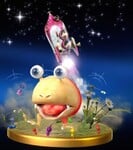
|
“On the planet Olimar is investigating, the native creatures become extra violent at night, forcing him to retreat to orbit every evening. His Final Smash works the same way: night falls and Olimar takes to the sky, leaving his foes to the mercy of the wildlife below. Olimar returns when dawn breaks and you can adjust his less-than-safe landing!”
| ||
“On the planet of the Pikmin, the native creatures get quite violent come nightfall, so Olimar retreats to orbit every evening. That's how his Final Smash works, too: Olimar takes off in his trusty Dolphin[sic], then in come the beasties to take care of the other fighters. When Olimar returns, make sure he touches down, er...safely!”
| |||
| How to obtain: Complete All-Star mode with Olimar or Alph. | Type: Final Smash | Trophy Box: 92. Final Smashes 3 | |
Skipping to sunset[edit]
|
This article is a stub. You can help Pikipedia by expanding it. |
Durations[edit]
The exact duration of a day, the sunset stage, etc. varies between games, between versions, and between difficulty modes.
If the European version of Pikmin runs at 50 Hz, the gameplay speed will be slower (see framerate), which also makes the day longer.
The following table lists the real-world time that some states last for, in a mm:ss format.
| Game | Whole day | Half day | Sunset | Countdown |
|---|---|---|---|---|
| Pikmin (60 Hz) | 13:30 | 06:46 | 01:06 | 00:30 |
| Pikmin (50 Hz) | 16:12 | 08:06 | 01:21 | 00:38 |
| Pikmin 2 | 13:02 | 06:29 | 01:05 | 00:32 |
| Pikmin 3 | 13:00 | 06:30 | 02:10 | 00:32 |
| Pikmin 3 Deluxe, normal difficulty | 18:00 | 09:00 | 02:10 | 00:33 |
| Pikmin 3 Deluxe, hard and ultra-spicy difficulty | 13:00 | 06:30 | 02:10 | 00:33 |
| Pikmin 4 | 15:02 | 07:31 | 01:30 | 00:30 |
| Pikmin 4, Olimar's Shipwreck Tale | 11:00 | 05:30 | 01:30 | 00:30 |
The day is measured from the end of the landing cutscene to the start of the sunset cutscene. Half-day is measured from the end of the landing cutscene to the moment the mid-day chime plays. The sunset is measured from the moment the sunset warning appears on-screen to the start of the sunset cutscene. The countdown is measured from the moment the first digit appears on-screen to the start of the sunset cutscene. These times are measured without pausing, and without doing anything throughout the day, to ensure there are virtually no lag frames.
Measuring time[edit]
The Sun Meter displays 13 dots which mark changes of the hour. In Pikmin 2, these dots represent times from 7 AM to 7 PM.[3] In Pikmin 3, the final results menu shows the player the day number as well as the time of day in which the final boss was defeated, making it possible to conclude that days in Pikmin 3 start at 6 AM, and end at 6 PM.
First day[edit]
- See: Story Mode#First day
The first day of each game's main Story Mode is a bit special in that it serves as a tutorial of sorts. Because of this, some of the game's rules are changed for this day only.
Weather[edit]
In Pikmin 3, the weather can vary between days. The effects of weather are purely aesthetic. Most areas have 2 weather states, sunny and rainy, while the Distant Tundra has sunny and snowy. Compared to sunny weather, rainy weather has darker lighting, different music, faint splashes on the ground, and makes surfaces more shiny. Snowy weather makes faint snow fall from the sky and also changes the music. The weather has no effect on underground sections of areas.
The weather for a day is set at the beginning of the day while the game is loading, and does not change throughout the day. Generally, the weather is set randomly, with rainy weather having a 1/4 chance in the Tropical Wilds, Garden of Hope, and Twilight River, and snowy weather having a 1/2 chance in the Distant Tundra.[4] However, a day can be forced to have a specific weather type, if at the beginning of the day, the amount of progress through the story is at a specific level, and the player is in a specific area. (The variable used to track the game progress is also used for objectives.)
The weather will be forced to be sunny if, at the start of the day:
- It is day 1 in the Tropical Wilds.
- Brittany has not yet been rescued in the Garden of Hope.
- The double bridge has not been built in the Distant Tundra and it is at least the third day in the area (not including day 1).
- Charlie has been rescued but the Sandbelching Meerslug has not been defeated in the Tropical Wilds.
- The dam has not been lifted in the Twilight River.
- The Hocotatian has been saved from the Scornet Maestro but Blue Pikmin have not been obtained in the Garden of Hope.
- The Quaggled Mireclops has been defeated but the Hocotatian has not been rescued in the Garden of Hope.
- The cave has not yet been entered in the Formidable Oak.
The weather will be forced to be rainy if, at the start of the day:
- The Armored Mawdad has been defeated but the Data Glutton has not been collected in the Garden of Hope.
- The Sandbelching Meerslug has been defeated but the Folded Data Glutton has not been collected in the Tropical Wilds.
- The Scornet Maestro has been defeated but the Hocotatian has not been rescued in the Twilight River.
- Blue Pikmin have been obtained but the Quaggled Mireclops has not been defeated in the Garden of Hope.
- The cave has been entered in the Formidable Oak.
The weather will be forced to be snowy if, at the start of the day:
- It is day 1 in the Distant Tundra.
- The double bridge has not been built in the Distant Tundra and it is the first or second day in the area (not including day 1).
Daylight[edit]
As time goes by, the daylight changes much as it would on Earth, with the area being slightly foggy during the morning, the most lit during the middle of the day, and darker near the night.
In Pikmin, the shadows under Pikmin and Olimar point in different directions as the day goes by. At the start of the day, they point to the southwest, at midday, to the south, and near the end, to the southeast. This is similar to sun-cast shadows on planet Earth, given that the sun rises on the east (and hence, the shadows are cast to the west), and sets on the west. In order to avoid rendering too many shadows at once and slowing the game down, Pikmin shadows are completely omitted if there are 51 or more Pikmin on the field.
In Pikmin 2, the shadow limit does not exist, but shadows do not change direction as the day progresses and are cast directly under the leaders or Pikmin.
In Pikmin 3, all objects cast shadows, and these shadows change direction throughout the day, but remain mostly directly below objects to allow depth to be judged more easily, only elongating very near the sunset. The direction of shadows corresponds with the location of the sun, which can be seen in the sky with the KopPad camera. The compass direction where the sun rises and sets varies between areas and segments. This is because different segments are rotated by varying amounts in the radar compared to their orientation within the area's model, which causes the direction of north to vary between segments. In segments where compass directions are not rotated relative to the area's model, the sun rises in the south, moves through the west of the sky, and sets in the north. Other segments have the sun rise and set in different directions based on their rotation.
Badges[edit]
In Pikmin 3 Deluxe, there is a badge the player can gain from spending days on PNF-404:
- New Horizons: Complete day 1 in Story Mode.
Gallery[edit]
|
This article or section is in need of more images. |
Red and Rock Pikmin being left behind.
Trivia[edit]
- The sunset cutscenes cannot be skipped in the US version of Pikmin, but they can in the European version, as well as all New Play Control! and Nintendo Switch ports.
- In the Wistful Wild at sunset, a Gatling Groink can shoot at and damage the leaders. They cannot be knocked down with this method, however.
- The End of Day trophy description in Super Smash Bros. Brawl is worded in a way that makes it sound like Olimar uses the Onion, with all of his Pikmin on board; neither of these are true, as Olimar uses the Hocotate ship and some Pikmin can get left behind. This is the case for both the Final Smash and the Pikmin series mechanic.
- Similarly, the European trophy description in Super Smash Bros. for Wii U incorrectly claims that Olimar uses the S.S. Dolphin during his Final Smash, when in reality, it is the Hocotate ship.
- In Pikmin 2, there is a small delay before the day time continues, when unpausing the game. By repeatedly pausing and unpausing, one can gain a slight bit of time.[5]
- In Pikmin 2, the text for the message "Hurry! Gather your Pikmin!" changes color depending on how much time is left. From 10 to 7 it is white, from 6 to 4, yellow, and from 3 to 0 it is a reddish orange.
- In Pikmin 3, if the Master Onion was in the process of beaming up something while the sunset cutscene starts, the effects for the beaming will remain throughout the cutscene, until it sucks in its "legs".
- In Pikmin 3, if all leaders become unconscious while the safety zone rings are visible, they will stay visible throughout the sunset cutscene.
- In Pikmin 3, thanks to the KopPad, it is possible to watch the sunset.[6]
- In the North American instruction manual of the GameCube version of Pikmin, the "Go to Sunset" option in the pause menu is instead labeled as "Wait until night".
Names in other languages[edit]
| Language | Name | Meaning | Notes |
|---|---|---|---|
| 日? Hi |
Day | Day counter displays English name. | |
(traditional) |
天 Tiān |
Day | Day counter displays English name. |
(simplified) |
天 Tiān |
Day | |
| Jour | Day | ||
| Tag | Day | ||
| Giorno | Day | ||
| 일 il |
Day | Day counter displays English name. | |
| Día | Day |
Sunset
| Language | Name | Meaning |
|---|---|---|
| 日没? Nichibotsu |
Sunset | |
(traditional) |
日落 Rìluò |
Sunset |
(simplified) |
日落 Rìluò |
Sunset |
| Coucher du soleil | Sunset | |
| Sonnenuntergang | Sunset | |
| Tramonto | Sunset | |
| 일몰 ilmol |
Sunset | |
| Ocaso | Sunset |
See also[edit]
References[edit]
- ^ YouTube video showing how Pikmin outside of the base, but trying to go to the Onion are considered safe, published on December 28th, 2022, retrieved on December 28th, 2022
- ^ YouTube video showing how Pikmin left near an inactivated Onion survive the sunset, in Pikmin 2, published on June 25th, 2018, retrieved on June 26th, 2018
- ^ Data inside
/user/Abe/time/time.ini, in Pikmin 2. The following three lines indicate the initial hour, final hour and day duration in seconds:{fp00} 4 7.000000 # ゲーム開始時刻 {fp01} 4 19.000000 # ゲーム終了時刻 {fp02} 4 1560.000000 # 1日の時間秒) - ^ This data is based on experiments in both versions of Pikmin 3, and the exact probabilities may be different.
- ^ YouTube video demonstrating how it is possible to gain a small bit of time by continuously pausing and unpausing the game
- ^ YouTube video demonstrating how it is possible to watch the sunset in Pikmin 3
| Hazards | ||||||||||||||||||||
|---|---|---|---|---|---|---|---|---|---|---|---|---|---|---|---|---|---|---|---|---|
| ||||||||||||||||||||
| Other hazards |
